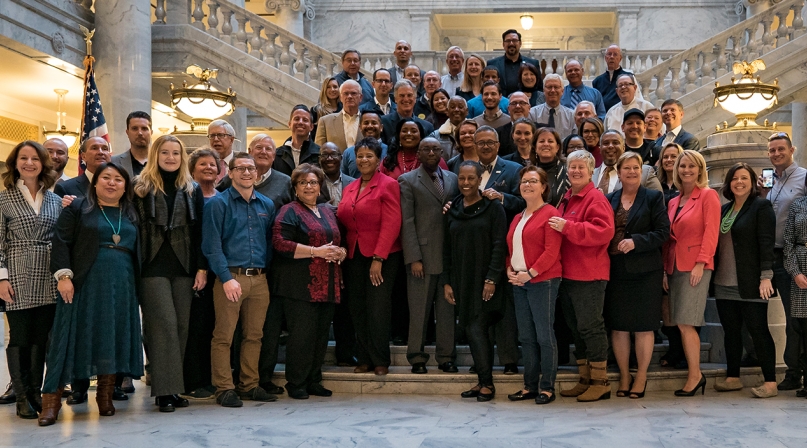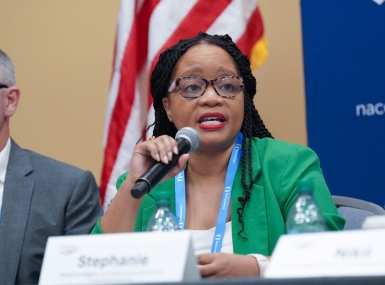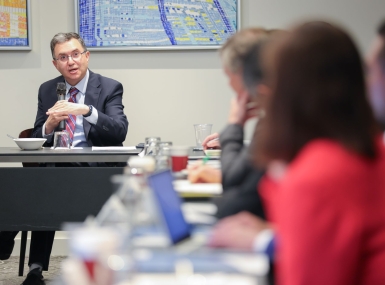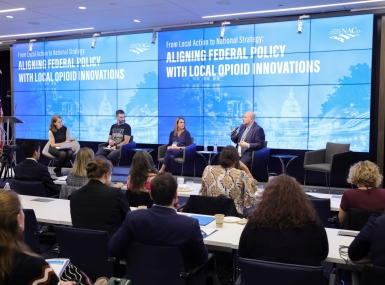LUCC members talk solutions to urban challenges

NACo's LUCC meets in Salt Lake County to talk issues for urban counties
About 100 county officials and others gathered Oct. 25-27 in Salt Lake County, Utah to tackle some of the country’s thorniest issues — including the opioid crisis and homelessness — at NACo’s 2017 Large Urban County Caucus (LUCC) Symposium.
Learn More
Spice Kitchen Incubator cooks up ways to help refugees
LUCC members heard from thought leaders on everything from impact investing to the organic growth of urban areas at the three-day annual conference, held this year in the mountains of Salt Lake County.
“We plan to take these innovations and strategies back to the people we serve,” LUCC Chair Larry Johnson, commissioner, DeKalb County, Georgia, said during the opening session.
Salt Lake County Mayor Ben McAdams, welcomed NACo members to his county and talked about some of the innovative programs happening there. “We’ve thrown our doors open and we’re proud of that,” he said of the county’s Spice Kitchen Incubator, one of the stops during the symposium. The kitchen helps the county’s 70,000 refugees start their own culinary businesses. “It’s also added to our food diversity and our culture,” he said. McAdams also noted the success of the $119 million Eccles Theater, a public-private project completed last year that was also a tour stop for county officials; it now sells out its season subscriptions and is revitalizing the downtown area.
Qualtrics CEO addresses LUCC members
LUCC members also heard from Ryan Smith, the co-founder and CEO of Qualtrics headquartered in nearby Provo. Offering solutions for measuring things such as customer satisfaction and employee engagement, the company “is helping folks gather a different type of data — it’s called ‘experience data,’” Smith said. A father of five who admits to a mean Mountain Dew habit, Smith founded the software firm in 2002 with his dad Scott in the basement of the family’s home; it is now worth $2.5 billion, according to Fortune.
Smith attributes his company’s success partly to its culture. “Unless you’re all in on something, you’re not going to do a great job,” he said. Being “all in” is one of his company’s core values or TACOS. The acronym stands for: Transparency; All In; Customer Obsession; One Team; and Scrappy.
The company holds weekly 30-minute meetings to catch employees up on everything that’s going on, department by department, as well as introduce new hires, even if Smith is out of town.
Smith, whose company hosted an executive leadership meeting for LUCC members at the company headquarters, calls counties “these silent carriers of our government that are making everything work — a lot of times on what seems like a volunteer basis, but you’re actually stewards over the future.”
Using a business model to solve social problems
A new way that counties are trying to make things work is with impact investing, a model for investments made with the intention to generate social impact along with financial return, said Jeremy Keele, president and CEO of Sorenson Impact Center at the University of Utah in Salt Lake City, which counts cities and counties among its clients. Keele drove home the idea that traditional philanthropic dollars “are a drop in the bucket” and while those dollars play a role, they do not solve problems. “The funding gap has to be solved,” he said. “What we haven’t done a good job of is ‘What are the net results? Are we seeing long-term improvements?’ We need data systems in place.”
While Sorenson works to structure, Andi Phillips, founder and managing partner, Maycomb Capital, who also addressed LUCC members, “works to finance.” Phillips noted that local governments are often “reinventing the wheel” when it comes to financing programs, and she is seeking to create financial models that sustain programs.
“I admire what you all are doing — I admire your determination and service,” said James Lee “Jim” Sorenson, Sorenson Impact Foundation board chairman. Sorenson said he is trying to build on the philanthropic model after he recognized that it’s possible to use a business model to address social problems. Sorenson closed his remarks with an optimistic phrase that was a favorite of his father’s, the late James LeVoy Sorenson: “The best is yet to come.”
Living in an increasingly urban world
While impact investing and data-driven solutions are some of the answers to counties’ problems, author and physicist Dr. Geoffrey West gave LUCC members plenty to ponder during a “big picture” luncheon address Oct. 25, when he compared the synergy of urban areas to living organisms.
“There’s a fundamental law of physics — if you use energy to create order... to create a cell, a city, a company…you must also inevitably and inextricably create disorder,” he said. “That’s called entropy.” When we think of urban areas, West said, “we think of the physicality — the roads, the skyscrapers.” Urban areas are actually “the platform in which social interaction takes place” that “facilitates wealth and ideas.”
Explosive population growth is on tap for urban areas, West noted. The pressures on the social fabric, as the world becomes increasingly urbanized, will be enormous, he warned the audience.
Attachments
Related News

LUCC members discuss importance of urban transit
Following low ridership during and after the COVID-19 pandemic, investing in urban county transit systems is essential, now more than ever, to cultivate thriving communities, LUCC members said.

Ongoing support is crucial for counties tackling overdose rates
The best treatment option for polysubstance use is “contingency management,” which is when someone with substance use disorder is given an incentive, such as money, for not using.

Proposed federal mandates cloud opioid treatment
Counties are positioned to quickly feel the effects of Office of National Drug Control Policy’s new priorities.
